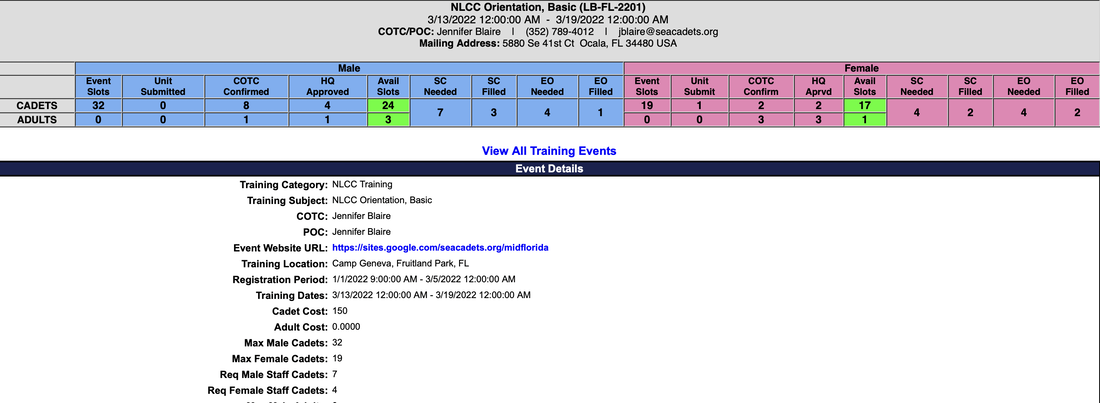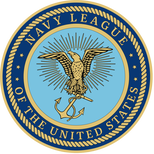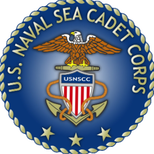All new cadets must complete Recruit Training (RT) prior to attending follow-on Advanced Training (AT). Most RT is during the summer but is available in selected locations during the winter during the holiday break. Our region normally hosts RT locally, usually in Massachusetts, in late June or early July. Cadets may attend any RT offered throughout the country. Though attending our regional RT is preferred, the scheduled weeks may not always align with family plans. Normally information on RT is not officially published until March/April. Dates of our regional RT will be promulgated once known and sometimes before the official posting. Please review the following information regarding the purpose of RT and how to sign up.
- Mission. NSCC Recruit Training (RT) is designed to indoctrinate new recruits in the core values, mission, and structure of the USNSCC; instill admiration for the Navy, Coast Guard, and the USNSCC; and to foster personal growth in the areas of grit, self- discipline, teamwork, self-confidence, accountability, basic military knowledge, and physical fitness.
- Goals. The goals of the training are to ensure the cadet feels comfortable when in a military uniform situation, to develop self-confidence in the individual’s role as a Sea Cadet, and to instill a sense of pride in one’s accomplishment upon successful completion of the training.
- Purpose. Recruit training is the cadet’s introduction to military routine and discipline and is the first step toward advancing in the Sea Cadet Program. Cadets normally spend 14 days learning basic Navy subjects, elementary seamanship, basic damage control, and physical fitness.
Prerequisites. In order to attend any NSCC RT:
- NSCC Cadets must be enrolled 6 weeks prior to the start of the training. The cadet must pass a Physical Readiness Test (PRT) prior to being released to attend training.
- The cadet must pass the E-1/Indoctrination Polaris Advancement Course (PAC) prior to registering for, or attending RT. Cadets are strongly encouraged to complete the E-2/ Seaman Apprentice PAC prior to attending RT.
- The cadet must obtain the required uniform items (Sea Bag List) and comply with directives as prescribed by the Commanding Officer of the Training Contingent (COTC).
How to sign up for RT.
- Cadet and their Families can look for RT opportunities on the Training List on Homeport. Filter using the "Recruit Trainings Radio Button (Figure 1).
- On the right hand side you will find a link called "details" (Figure 2). This will open a window (Figure 3) with more information which might include a link to a dedicated webpage and/or document downloads. You will find information on the training, any other required forms to submit and payment information whether electronically or by money order. Quotas and requirements are also listed.
- Once the desired training location and dates have been chosen, the cadet must request the training by training code RT-XX-XXXX to their chain of command. The first 2 letters indicates recruit training (RT). The next two letter will indicate the state of the training and the last for digits will indicate the year and training sequence (Figure 4).
- Sign up for training can only be initiated by Division Staff. Once signed up, a form NSCTNG 001 - REQUEST FOR TRAINING AUTHORITY is generated by the system and printed or emailed to the parents/guardians for their consent and approval. Do not fill out this form on your own. Click here for a sample form. Please read all the disclosures on the from.
- Parent/Guardian will initial section 6 . STATEMENT OF UNDERSTANDING (MEDICAL & STANDARDS OF CONDUCT)
- Parent/Guardian will provide medical insurance information in section 7a. - 7d.
- Parent/Guardian will print name, sign and date the form at the bottom. The original form with "wet" signatures will be returned to DEALEY Division staff.
- The unit staff will assist in completing any other required forms.
- Every RT includes a sea bag list and the family is responsible for purchasing any items not issued by the Division.
PARENT AND CADET RESPONSIBILITIES
- General. Following any cadet registration for any training, it is the responsibility of the parent and cadet to keep the Unit CO advised in any changes with regard to cadet profile information (e-mail, address, phone number, emergency contact, etc.) and particularly any change in medical status. With regard to medical status and medical screening, Unit COs are charged to ensure medical screening of cadets prior to training for determination of any change of status since their enrollment physical. New physicals are not required, only a review of medical status to ensure no changes that would preclude cadet success at training. Unit CO’s having this responsibility, generally accomplish this at the time of cadet registration for training or upon delivery of orders. It is the parent and cadet responsibility to ensure the Unit CO is advised of any further change in medical status between the time of Unit CO screening and actual departure for training.
- Medical Screening. Report of Medical History (NSCADM 001 Page 3 and 4). The Report of Medical History is to be completed by a parent or guardian, and shall be used to disclose all medical conditions, mental health conditions, hospitalizations or institutionalizations, allergies, and immunizations. The Report of Medical History must be updated: a) annually upon re-enrollment; b) upon any change to physical or mental health history; and c) within 30 days of reporting to any NSCC or NLCC training. If no changes have taken place in the cadet’s medical history since the last update, a parent or guardian may update the Report of Medical History by printing the date, printing “NO CHANGES,” and signing his or her name underneath the original signature block.
- Medical History Supplemental. (NSCADM 001 Pages 7 and 8). Prior to enrollment, cadet applicants who may require regular administration of any prescription or non- prescription medication during unit drills must submit a completed Medical History Supplemental. This form includes information about the medications, their dosing, instructions for administration, side effects, contraindications, and consequences of missing a dose. For over-the-counter medications, the form need only be signed by a parent or legal guardian and the unit Commanding Officer. For prescription medications, the form must also be signed by the prescribing medical provider. Cadets who do not require medications shall submit the Medical History Supplemental form signed by a parent or guardian upon enrollment, with “N/A” written across the front. The Medical History Supplemental must be updated: a) whenever there is a change in a medication, dosing, or administration instructions; and b) each time a cadet is attending a training. An updated Medical History Supplemental shall be forwarded to the COTC with the NSCTNG 001 Request for Training Authority each time a cadet requiring medication wishes to attend an NSCC or NLCC training.
- Transportation. It is the parents’ responsibility to arrange transportation to and from the training site. This means from the doorstep of the unit-drilling site or individual residence to the doorstep of the training site. When using commercial transportation, fees for taxi or shuttle bus should be considered in addition to the cost of airline, train, or bus tickets. Cadet travel expenses will only be covered by NHQ for those evolutions where it is clearly stated in the advertisement for the training. As a courtesy, some COTCs may offer travel assistance to and from local airports, train stations or bus stations. Cadets may not drive other cadets.
- Tickets. Parents are advised not to purchase non-refundable airline/train/bus tickets. Training evolutions are dependent upon escort availability, host site accommodations, and host training site security measures in effect at the time of training. Changes to non-refundable tickets can incur a significant penalty. Neither NHQ nor COTCs will reimburse for these penalties, regardless of reason.
- Unaccompanied Minors. The policies regarding travel for unaccompanied minors vary greatly among commercial carriers. Some airlines do not allow minors less than 15 years of age to travel without an adult, and the number of training staff may not allow for an escort officer to remain with the cadet until the time of departure for the return trip. Due to these potential issues, COs/parents will need to verify that the chosen carrier will allow them to travel alone, and they will need to review their travel arrangements with the COTC prior to purchasing tickets. Refer to the specific airline’s website for their policies; for general guidance regarding airline travel for unaccompanied minors, visit http://www.airsafe.com/kidsafe/kidrules.htm.






